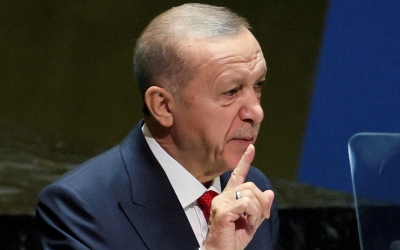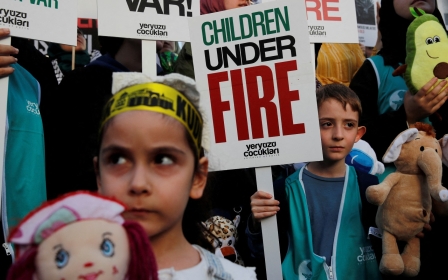Israel-Palestine war: Erdogan sips tea on the Black Sea as Blinken visits Ankara

As the US Secretary of State Antony Blinken visited Ankara trying to get help from Turkish officials on the Israel-Palestine war, President Recep Tayyip Erdogan was touring the picturesque highlands of Turkey’s Black Sea region, sharing cups of tea with locals.
Blinken convened with his Turkish counterpart, Hakan Fidan, in a meeting that stretched beyond the two-and-a-half-hour mark, conspicuously lacking the customary post-meeting news conference.
Sources painted the rendezvous as "constructive and positive".
Erdogan could have organised for him and Blinken to have met in Ankara. Instead, he chose not to, which has widely been perceived as a clear snub.
A Turkish official, seeking to downplay the incident, underscored that Blinken's designated counterpart is Fidan.
New MEE newsletter: Jerusalem Dispatch
Sign up to get the latest insights and analysis on Israel-Palestine, alongside Turkey Unpacked and other MEE newsletters
However, for decades it has been somewhat of a tradition for Erdogan to engage with every visiting US secretary of state, barring exceptional circumstances. In fact, he hosted Blinken in Ankara in February.
Ankara and Washington have had increasingly divergent views on the ongoing Israel-Palestine war as the body count in the Gaza Strip has escalated. It now stands at 10,000 Palestinians, including around 4,000 children, according to the Palestinian health authority.
The Biden administration has been stridently supportive of Israel’s Gaza offensive since the 7 October Hamas-led attack on Israeli communities that killed around 1,400 Israelis. Yet Turkey, while initially even-handed, has become increasingly agitated.
Last month, Erdogan even levelled direct criticism at Blinken, accusing the secretary of state of raising tensions through sectarian rhetoric.
In televised remarks, Erdogan said: "Of course, the US sending aircraft carriers to the region unfortunately does not contribute to peace or reduce tensions between the parties. The US secretary of state says 'I approach Israel as a Jew, not as a secretary of state.' What kind of approach is this? If, in response, the people tell you that they would approach the region as a Muslim, what would you say? You should approach people as humans."
Follow Middle East Eye's live coverage for the latest on the Israel-Palestine war
Erdogan's ire was further stoked by the downing of a Turkish armed drone by a US F-16 in northeastern Syria last month during a military operation against Syrian Kurdish forces aligned with Washington.
The Turkish president has also castigated Washington for its unwavering support of Israel's military operations in Gaza, denouncing them as "genocide".
Though Blinken and Fidan’s meeting was long, its contents remain ambiguous.
Speaking to reporters at the airport before his departure on Monday, Blinken said: "We discussed... efforts to significantly expand the humanitarian assistance to people in need, and efforts to prevent the conflict from spreading to other parts of the region and what we can do to set the conditions for a durable, sustainable, lasting peace for Israelis and Palestinians."
He also raised the issue of the 240 captives taken by Palestinian fighters to Gaza on 7 October, as well as Washington’s concern about Israeli settler violence against Palestinians in the occupied West Bank.
Turkish diplomatic sources told journalists that both Turkey and the United States have reached an accord to ensure the continuous delivery of humanitarian aid to the beleaguered Gaza Strip.
A measly amount of aid for Gaza’s 2.3 million residents has been intermittently allowed into the coastal enclave through its Rafah crossing with Egypt, most recently on Saturday. Aid workers say it barely scratches the surface of Gaza’s needs.
According to Turkish sources, Fidan emphasised to Blinken the need to shield civilians in Gaza from harm and ensure they are not displaced.
Israel’s indiscriminate targeting of civilian sites and infrastructure, such as hospitals and schools, was firmly decried, the sources said.
Middle East Eye delivers independent and unrivalled coverage and analysis of the Middle East, North Africa and beyond. To learn more about republishing this content and the associated fees, please fill out this form. More about MEE can be found here.





